- Home
- Roy J. Snell
The Magic Curtain Page 13
The Magic Curtain Read online
Page 13
CHAPTER XIII A NYMPH OF THE NIGHT
Florence had never seen the face lit up there in the night; yet it struckfear to her heart. What must we say, then, of Petite Jeanne? For this wasthe face of one who, more than any others, inspired her with terror. Heit had been who called after her at the door of the opera, he who hadlooked out from the bushes as she slept in the sun. At sight of him now,she all but fell among the rocks from sheer panic.
As for Florence, she was startled into action. They were, she suddenlyrealized, many blocks from any human habitation, on a deserted strip ofman-made shore land lighted only by stars and the moonlight. And at thismoment the moon, having failed them, had left the place black as a tomb.
With a low, whispered "Come!" and guided more by instinct than sight, sheled Jeanne off the tumbled pile of rocks and out to the path where grassgrew rank and they were in danger at any moment of tripping over piecesof debris.
"Who--who was that?"
Florence fancied she heard the little French girl's heart beating wildlyas she asked the question.
"Who can tell? There may be many. See! Yonder, far ahead, is a light."
The light they saw was the gleam of a camp fire. In this desolate spot itseemed strangely out of place; yet there is that about fire and lightthat suggests security and peace. How often in her homeland had PetiteJeanne felt the cozy warmth of an open fireplace and, secure from alldanger, had fallen asleep in the corner of a gypsy's tent. How often as achild had Florence, in a cane-seated rocker, sat beside the humblekitchen stove to hear the crackle of the fire, to watch its glow throughits open grate and to dream dreams of security and peace.
What wonder, then, that these two bewildered and frightened ones, atsight of a glowing fire, should leap forward with cries of joy on theirlips?
Nor were they destined to disappointment. The man who had built that fireloved its cheerful gleam just as they did, and for the very same reason:it whispered to him of security and peace.
He was old, was this man. His face had been deeply tanned and wrinkled bymany a sun. His hair was snow white. A wandering philosopher andpreacher, he had taken up his abode in a natural cavern between greatrocks. He welcomed these frightened girls to a place of security by hisfireside.
"Probably nothing to frighten you," he reassured them. "There are many ofus sleeping out here among the rocks. In these times when work is scarce,when millions know not when or where they are to eat and when, like ourMaster, many of us have nowhere to lay our heads, it will not seemstrange that so many, some by the aid of a pile of broken bricks and somewith cast-off boards and sheet-iron, should fashion here homes of a sortwhich they may for a brief time call their own.
"Of course," he added quickly, "all too soon this will be a thing of thepast. Buildings will rise here and there. They are rising even now. Threehave been erected on these very shores. Scores of buildings will dot themsoon. Palm trees will wave, orange trees blossom, grass and flowers willfringe deep lagoons where bright boats flash in the sun. All this willrise as if by magic and our poor abodes built of cast-off things willvanish, our camp fires gleam no more." His voice trailed off intonothingness. For a time after that they sat there silent, staring at thefire.
"That," said Florence, speaking with some effort, "will be too bad."
"No, I suppose not." The old man's voice was mellow. "It's going to be aFair, a great Exposition. Millions of eager feet will tramp over the veryspot where we now sit in such silence and peace. They are to call it the'Century of Progress.' Progress," he added dreamily. "Progress. That islife. There must be progress. Time marches on. What matter that some areleft behind?
"But, see!" His tone changed. "Great clouds are banking up in the west.There will be a storm! My poor shelter does well enough for me. For youit will not suffice.
"You will do well to go forward," he advised, as they sprang to theirfeet. "It is a long way back over the path you have come. If you goforward it is only a matter of a few blocks to a bridge over the railroadtracks. And across that bridge you will find shelter and a street car tocarry you home."
As he stood there by the fire, watching their departure, he seemed aheroic figure, this wandering philosopher.
"Surely," Florence whispered to herself, "it is not always the rich, thefamous, the powerful who most truly serve mankind."
Once more she was reminded of the little old lady and her one treasure,the priceless cameo fashioned by skilled and loving fingers so many yearsago.
"And I promised to return it to her!" This thought was one almost ofdespair.
"And yet," she murmured, "I made that promise out of pure love. Who knowshow Providence may assist me?"
There appeared to be, however, little time for thoughts other than thoseof escape from the storm. Their hurried march south began at once.
* * * * * * * *
As for the man who had so inspired them with terror, the one of the evileye, he had not followed them. There is some reason to doubt that he somuch as saw them. Had his attention been directed toward them, it seemsprobable that he would have passed them by as unknown to him and quiteunimportant for he, as we must recall, knew Jeanne only as the boy usher,Pierre.
Truth was, this young man, who would have laughed to scorn any suggestionthat his home might be found in this tumbled place, was engaged in aspecial sort of business that apparently required haste; for, afterpassing down the winding path at a kind of trotting walk, he hastenedpast a dark bulk that was a building of some size, turned to the right,crossed a temporary wooden bridge to come out at last upon the islandwhich was also a part of the city's "made land." It was upon this islandthat Florence, a few evenings before, had discovered the mysterious girland the more mystifying house that was so much like a ship, and yet soresembled a tiny church.
Even while the two girls talked to the ragged philosopher, this evil-eyedone with the dark and forbidding face had crossed the island and, comingout at the south end, had mounted the rock-formed breakwater where someframe-like affair stood.
At the far end of the frame was a dark circle some twenty feet indiameter. This circle was made of steel. It supported a circular dip-netfor catching fish. There was a windlass at the end of the pole supportingthe net. By unwinding the windlass one might allow the net to sink intothe water. If luck were with him, he might hope to draw it up after atime with a fair catch of perch or herring.
All day long this windlass might be heard screaming and creaking as itlifted and lowered the net. For the present it was silent. The fishermanslept. Not so this dark prowler.
The man with the evil eye was not alone upon the rocks that night, thoughbeyond a shadow of a doubt he believed himself to be. Off to the left, ata distance of forty yards, a dark figure, bent over in a position ofrepose and as still as the rocks themselves, cast a dark shadow over thenear-by waters. Did this figure's head turn? Who could say? Certainly theman could not, for he believed himself alone. However, he apparently didnot expect to remain unmolested long, for his eyes were constantlyturning toward the barren stretch of sand he had crossed.
His movements betrayed a nervous fear, yet he worked rapidly. Havingsearched about for some time, he located a battered bucket. This hefilled with water. Bringing it up, he threw the entire contents of thebucket upon the windlass. Not satisfied with this, he returned for asecond bucket of water and repeated the operation.
Satisfied at last, he drew a package wrapped in black oilcloth frombeneath his coat and tossed it to the center of the dangling net. Thenwith great care lest the rusty windlass, for all the careful soaking hehad given it, should let out a screeching complaint, he quietly loweredthe net into the lake. The water had done its work; the windlass gaveforth no sound.
After this he turned and walked slowly away.
He was some fifty feet from the windlass, busy apparently incontemplating the dark clouds that threatened to obscure the moon, whenalmost at the same instant two c
auses for disturbance entered his notuneventful life. From the direction of the lake came a faint splash. Atthe brow of the little ridge over which he had passed to reach this spot,two men had appeared.
That the men were not unexpected was at once evident. He made no attemptto conceal himself. That the splash puzzled him went without question. Hecovered half the distance to the breakwater, then paused.
"Poof! Nothing! Wharf rat, perhaps," he muttered, then returned to hiscontemplation of the clouds. Yet, had he taken notice before of thatsilent figure on the rocks, he might now have discovered that it hadvanished.
The two men advanced rapidly across the stretch of sand. As they cameclose there was about their movements an air of caution. At last onespoke:
"Don't try anything, Al. We got you."
"Yeah?"
"Yes. And the goods are on you!"
"Yeah?"
The dark, evil-eyed one who was apparently known as Al, stood his ground.
The moon lost itself behind a cloud. The place went dark. Yet when themoon reappeared, bringing out the gleam of an officer's star upon thebreast of one of the newcomers, he stood there motionless.
"Will you hand it over, or shall we take you in?" It was the man with thestar who spoke.
"You've got nothing on me!" Al threw open his coat. "Look me over."
"We will. And then--"
"Yeah? And then?"
"We'll see."
At that instant, all unseen, a dripping figure emerged from the waterclose to the submerged fishing net. It was the figure that, but a shorthalf hour before had rested motionless upon the rocks; a slender girlwhose figure was for a second fully outlined by a distant flash oflightning. She carried some dark object beneath her right arm.

 On the Yukon Trail
On the Yukon Trail Wings over England
Wings over England Johnny Longbow
Johnny Longbow Sally Scott of the WAVES
Sally Scott of the WAVES The Secret Mark
The Secret Mark Betty Leicester's Christmas
Betty Leicester's Christmas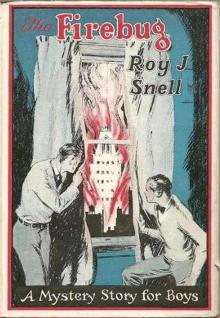 The Firebug
The Firebug Minnie Brown; or, The Gentle Girl
Minnie Brown; or, The Gentle Girl Jack the Hunchback: A Story of Adventure on the Coast of Maine
Jack the Hunchback: A Story of Adventure on the Coast of Maine The Silent Alarm
The Silent Alarm The Arrow of Fire
The Arrow of Fire The Magic Curtain
The Magic Curtain The Crystal Ball
The Crystal Ball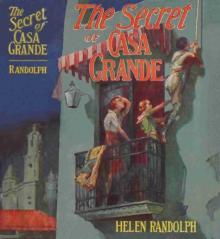 The Secret of Casa Grande
The Secret of Casa Grande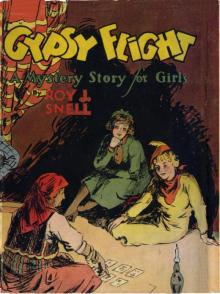 Gypsy Flight
Gypsy Flight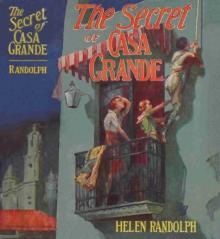 The Mystery of Carlitos
The Mystery of Carlitos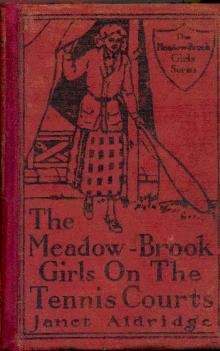 The Meadow-Brook Girls on the Tennis Courts; Or, Winning Out in the Big Tournament
The Meadow-Brook Girls on the Tennis Courts; Or, Winning Out in the Big Tournament Witches Cove
Witches Cove Riddle of the Storm
Riddle of the Storm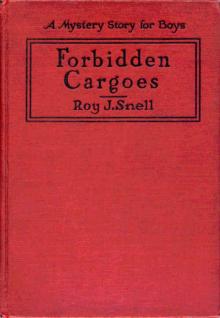 Forbidden Cargoes
Forbidden Cargoes Green Eyes
Green Eyes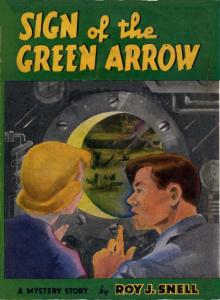 Sign of the Green Arrow
Sign of the Green Arrow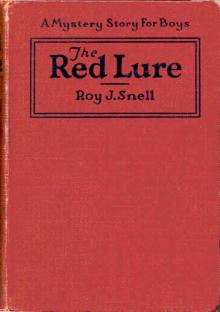 The Red Lure
The Red Lure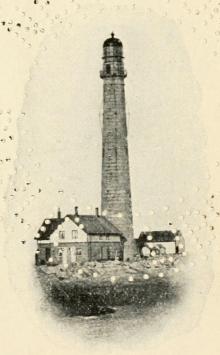 The Light Keepers: A Story of the United States Light-house Service
The Light Keepers: A Story of the United States Light-house Service A Ticket to Adventure
A Ticket to Adventure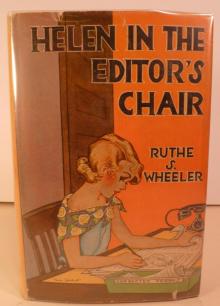 Helen in the Editor's Chair
Helen in the Editor's Chair Blue Envelope
Blue Envelope The Purple Flame
The Purple Flame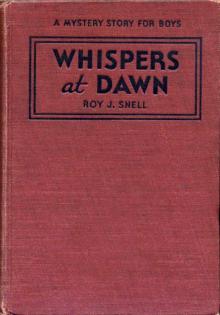 Whispers at Dawn; Or, The Eye
Whispers at Dawn; Or, The Eye The Rope of Gold
The Rope of Gold Crossed Trails in Mexico
Crossed Trails in Mexico The Shadow Passes
The Shadow Passes Red Dynamite
Red Dynamite Blue Grass Seminary Girls on the Water
Blue Grass Seminary Girls on the Water The Cruise of the O Moo
The Cruise of the O Moo